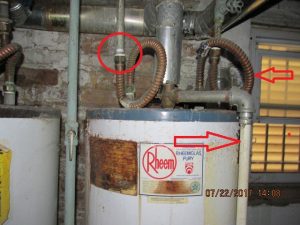The home inspector is not a plumber
The home inspector shall observe: Interior water supply and distribution system, including: piping materials, supports, and insulation; fixtures and faucets; functional flow; leaks; and cross connections; Interior drain, waste, and vent system, including: traps; drain, waste, and vent piping; piping supports and pipe insulation; leaks; and functional drainage; hot water systems including: water heating equipment; normal operating controls; automatic safety controls; and chimneys, flues, and vents; fuel storage and distribution systems including: interior fuel storage equipment, supply piping, venting, and supports; leaks; and sump pumps. The home inspector shall describe: Water supply and distribution piping materials; drain, waste, and vent piping materials; Water heating equipment; and Location of main water supply shutoff device. The home inspector shall operate all plumbing fixtures, including their faucets and all exterior faucets attached to the house.
Inspector is not required:
State the effectiveness of anti-siphon devices; Determine whether water supply and waste disposal systems are public or private; Operate automatic safety controls; Operate any valve except water closet flush valves, fixture faucets, and hose faucets; Observe: Water conditioning systems; Fire and lawn sprinkler systems; On-site water supply quantity and quality; On-site waste disposal systems; Foundation irrigation systems; Spas, except as to functional flow and functional drainage; Swimming pools; Solar water heating equipment; or Observe the system for proper sizing, design, or use of proper materials.

We don’t perform plumbing inspections outside scope of home inspection. We recommend a licensed plumber for “plumbing by code” inspections.
The plumbing in the home will inspected and reported on with the above information. While the inspector makes every effort to find all areas of concern, some areas can go unnoticed. Older homes can have galvanized supply lines or clogged cast iron drain lines. All defects in the inspection report should be considered before purchase. A qualified contractor or licensed plumber should be used in your further inspection or repair issues as it relates to the comments in the home inspection report.
The home’s water supply should be in working order when it comes to examining the plumbing system a home. The home could have lead pipes. Lead regardless of its usability is an environmental toxin and if you have children, you may not want to live in a home that has lead pipes.
The home could have a sewage a municipal sewer system. A septic tank could be part of a plumbing drainage system as well. Search for the installed septic tank on the property, how much the tank holds, and where the lines to the septic tank are located. Septic tanks can be extremely costly and may cost thousands of dollars to substitute or repair.
Make sure the kitchen faucets and bathroom faucets are not leaking or drips and check underneath sinks to check for leaking pipes. Cooper pipes versus Galvanized pipes installed in the house makes a big difference when you are purchasing a house.
Addressing problems before the sale is of utmost importance. It is significant that you deal with any all tribulations that you find in the home’s plumbing system before making an offer.
At the same time as many homes come with a home warranty that will cover up the an assortment of systems inside the home for a specific period of time but still you can be out of pocket if the plumbing system is in shabby state.
